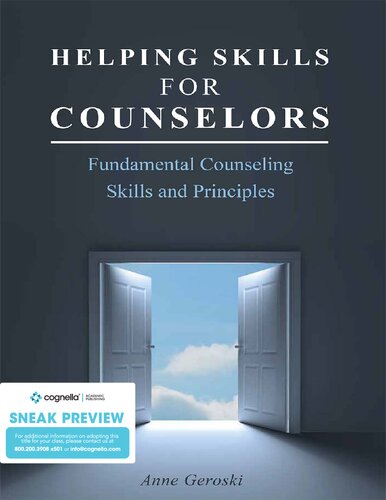

Most ebook files are in PDF format, so you can easily read them using various software such as Foxit Reader or directly on the Google Chrome browser.
Some ebook files are released by publishers in other formats such as .awz, .mobi, .epub, .fb2, etc. You may need to install specific software to read these formats on mobile/PC, such as Calibre.
Please read the tutorial at this link: https://ebookbell.com/faq
We offer FREE conversion to the popular formats you request; however, this may take some time. Therefore, right after payment, please email us, and we will try to provide the service as quickly as possible.
For some exceptional file formats or broken links (if any), please refrain from opening any disputes. Instead, email us first, and we will try to assist within a maximum of 6 hours.
EbookBell Team

4.8
84 reviewsThis text offers a comprehensive introduction to the basic tenets of mental health-related counseling. Aimed at graduate-level students studying mental health counseling, school counseling, or similarly related professions, this text will enable students to become familiar with the foundational skills required to implement various counseling approaches and to work in diverse counseling environments.
The first section of the text presents a contemporary introduction to the practice of professional helping. It addresses the basics of helping relationships with an emphasis on understanding the ways in which these relationships are shaped by power, privilege, and experiences of bias and discrimination. Readers are introduced to the concepts of social discourse and positioning theory. These theories offer insight into many of the challenges that clients bring in to therapy, so understanding them augments the ways in which we think about clients and about helping. This section also includes a basic overview of interpersonal neurobiology to help students understand the complex connections between human behavior and the central nervous system, particularly in regard to the expression of empathy, affect regulation, and complex trauma. Finally, this first section provides an overview of ethical practice and the importance of self-awareness and self-care.
With these foundational ideas in place, the second section of the text delves into particular counseling skills that can be used in individual counseling work, in leading groups, and in crisis response. These skills range from communicating empathy, attentive listening, and asking questions, to using paraphrases, immediacy, confrontation, and many additional additive skills. Readers are also introduced to some basic change strategies that can be used across modalities. These include problem solving, affect regulation, motivating change, mindfulness, advocacy, and other transmodality change strategies. The text concludes with separate chapters on basic skills for working with groups and crisis response work.
Designed to introduce fundamental skills in helping to mental health counselors, as well as clinicians across a variety of professional disciplines, Helping Skills for Counselors is an invaluable resource for students of mental health counseling, school counseling, social work, and psychology.
Anne Geroski, Ph.D., is an associate professor in the counseling program at The University of Vermont. She earned her doctorate degree in counselor education from University of Maine-Orono and has served as an administrator, elementary school counselor, mental health clinician, and consultant in various settings across the U.S. and abroad.